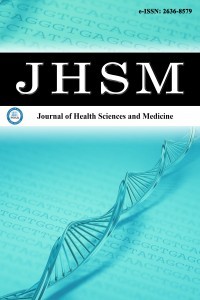Impact of Ramadan fasting on eGFR in patients with late stage chronic kidney disease
Impact of Ramadan fasting on eGFR in patients with late stage chronic kidney disease
Ramadan fasting, chronic kidney disease, glomerular filtration rate, metabolic parameters kidney function,
___
- El-Wakil HS, Desoky I, Lotfy N, Adam AG. Fasting the month of Ramadan by Muslims: Could it be injurious to their kidneys? Saudi J Kidney Dis Transpl. 2007;18(3):349.
- Mbarki H, Tazi N, Najdi A, Tachfouti N, Arrayhani M, Sqalli T. Effects of fasting during Ramadan on renal function of patients with chronic kidney disease. Saudi J Kidney Dis Transpl. 2015;26(2):320-324. doi:10.4103/1319-2442.152494
- Al Muhanna FA. Ramadan fasting and renal failure. Saudi Med J. 1998;19(3):319-321.
- Hassan S, Hassan F, Abbas N, et al. Does Ramadan Fasting Affect Hydration Status and Kidney Function in CKD Patients? Ann Nutr Metab. 2018;72(3):241-247. doi:10.1159/000486799
- Ahmad S, Chowdhury TA. Fasting during Ramadan in people with chronic kidney disease: a review of the literature. Ther Adv Endocrinol Metab. 2019;10:2042018819889019.
- The future of the global Muslim population. Pew Research Center’s Religion & Public Life Project. Published January 27, 2011. Accessed July 26, 2023. Available at: https://www.pewresearch.org/religion/2011/01/27/the-future-of-the-global-muslim-population/
- Demir ME. Böbrek hastaları ve oruç ibadeti. Med Princ Pract. 2018;1(2):45-46. doi:10.32322/jhsm.400011
- Hassanein M, Al-Arouj M, Hamdy O, et al. Diabetes and Ramadan: practical guidelines. Diabetes Res Clin Pract. 2017;126:303-316.
- Nazzal Z, Hamdan Z, Masri D, Abu-Kaf O, Hamad M. Prevalence and risk factors of chronic kidney disease among Palestinian type 2 diabetic patients: a cross-sectional study. BMC Nephrol. 2020;21(1):484. doi:10.1186/s12882-020-02138-4
- Chow CK, Teo KK, Rangarajan S, et al. Prevalence, awareness, treatment, and control of hypertension in rural and urban communities in high-, middle-, and low-income countries. JAMA. 2013;310(9):959-968. doi:10.1001/jama.2013.184182
- Habas E Sr, Errayes M, Habas E, et al. Fasting Ramadan in chronic kidney disease (CKD), kidney transplant and dialysis patients: review and update. Cureus. 2022;14(5): e25269.
- Turkish Society of Nephrology, 2019 annual registry; available from https://nefroloji.org.tr/uploads/folders/file/registry_2019.pdf Accessed: 19.07.2023
- Kara E, Sahin OZ, Kizilkaya B, et al. Fasting in Ramadan is not associated with deterioration of chronic kidney disease: a prospective observational study. Saudi J Kidney Dis Transpl. 2017;28(1):68-75. doi:10.4103/1319-2442.198140
- NasrAllah MM, Osman NA. Fasting during the month of Ramadan among patients with chronic kidney disease: renal and cardiovascular outcomes. Clin Kidney J. 2014;7(4):348-353.
- Emami-Naini A, Roomizadeh P, Baradaran A, Abedini A, Abtahi M. Ramadan fasting and patients with renal diseases: a mini review of the literature. J Res Med Sci. 2013;18(8):711-716.
- Bernieh B, Al Hakim MR, Boobes Y, Abu Zidan FM. Fasting Ramadan in chronic kidney disease patients: clinical and biochemical effects. Saudi J Kidney Dis Transpl. 2010;21(5):898-902.
- Einollahi B, Lessan-Pezeshki M, Pourfarziani V, et al. Ramadan fasting in kidney transplant recipients with normal renal function and with mild-to-moderate renal dysfunction. Int Urol Nephrol. 2009;41(2):417-422. doi:10.1007/s11255-008-9476-y
- Ansari FA, Latief M, Manuel S, et al. Impact of fasting during Ramadan on renal functions in patients with chronic kidney disease. Indian J Nephrol. 2022;32(3):262-265.
- Abdullah M, Wahyudi ER, Nugroho P, Alfian A. Kidney function profile before, during, and after Ramadan fasting in healthy elderly: a prospective cohort study. Med J Indonesia. 2022;31(2):115-119.
- Eldeeb AA, Mahmoud MA, Ibrahim AB, Yousef EA, Sabry AA. Effect of Ramadan fasting on arterial stiffness parameters among Egyptian hypertensive patients with and without chronic kidney disease. Saudi J Kidney Dis Transpl. 2020;31(3):582-588.
- Chowdhury A, Khan H, Lasker SS, Chowdhury TA. Fasting outcomes in people with diabetes and chronic kidney disease in East London during Ramadan 2018: The East London diabetes in Ramadan survey. Diabetes Res Clin Pract. 2019; 152:166-170.
- Akaberi A, Golshan A, Moojdekanloo M, Hashemian M. Does fasting in Ramadan ameliorate Lipid profile? a prospective observational study. Pak J Med Sci Q. 2014;30(4):708-711.
- Akhtar P, Kazmi A, Sharma T, Sharma A. Effects of Ramadan fasting on serum lipid profile. J Family Med Prim Care. 2020;9(5):2337-2341. doi:10.4103/jfmpc.jfmpc_550_19
- Darzabi T, Hejazi K. The effects of Ramadan fasting on electrolytes index, serum osmolarity and body composition in fasting and non-fasting students: A quasi-experimental study. Jundishapur J Chronic Dis Care. 2020;9(2). doi:10.5812/jjcdc.100079
- Yayın Aralığı: Yılda 6 Sayı
- Başlangıç: 2018
- Yayıncı: MediHealth Academy Yayıncılık
Canay YILMAZ ASAN, Cemil EREN, Fatma DOĞRUEL, Ahmet Emin DEMİRBAŞ
Evaluation of the relationship between mitral annular calcification and triglyceride-glucose index
Gökhan GÖKALP, Nail Burak ÖZBEYAZ, Murat Oguz ÖZİLHAN
Quality analysis of YouTube videos in the management of hyperlipidemia in adults
Mercan TAŞTEMUR, Ceren MORDAĞ ÇİÇEK
The role of carbondioxide insufflation in preventing postoperative peritoneal adhesions in rats
Harun KARABACAK, Murat AKIN, Tonguç Utku YILMAZ, Güldal YILMAZ, Özlem GÜLBAHAR
Mesut BAKIR, Şebnem RUMELİ, Mehmet Rıdvan YALIN, Fatma ÇELİK
Emre DESTEGÜL, Burçak ÇAKIR PEKÖZ, Sevtap SEYFETTİNOĞLU, Sevda BAŞ, Fikriye Işıl ADIGÜZEL, Mehmet NARİN
The relationship between osteoporosis and non-dipper hypertension in postmenopausal women
Tolga ÇAKMAK, İskender KADİFE, Erkan AYHAN, Turgay IŞIK
Seray HAZER, Seher SATAR, İpek CANDEMİR, Pınar ERGÜN, Leyla Nesrin ACAR, Selim Şakir Erkmen GULHAN
Quality, reliability, and content assessment of YouTube™ videos associated with aphasia
